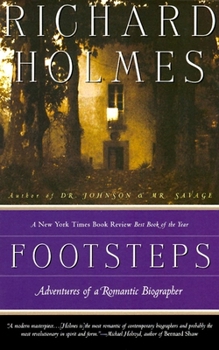Footsteps: Adventures of a Romantic Biographer
Select Format
Select Condition 
Book Overview
Richard Holmes knew he had become a true biographer the day his bank bounced a check that he had inadvertently dated 1772. Because for the acclaimed chronicler of Shelly and Coleridge, biography is a... This description may be from another edition of this product.
Format:Paperback
Language:English
ISBN:0679770046
ISBN13:9780679770046
Release Date:April 1996
Publisher:Knopf Publishing Group
Length:304 Pages
Weight:0.69 lbs.
Dimensions:0.7" x 5.5" x 8.6"












